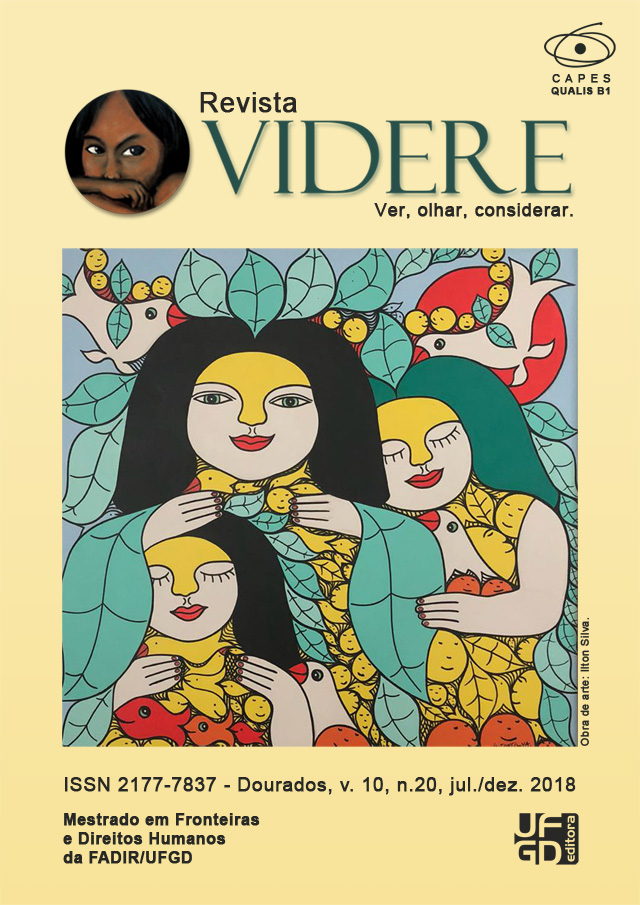A estética da fé: ecos de uma Democracia Encurralada
DOI:
https://doi.org/10.30612/videre.v10i20.8213Keywords:
Democracia. Estética. Fé. Política.Abstract
O que aproxima duas figuras políticas como Recep Tayyip Erdogan, atual Presidente da República da Turquia, e Marcelo Crivella, Prefeito do Rio de Janeiro, eleito em 2016? Buscar respostas para esta pergunta pode ajudar a compreender a atualidade política do Rio de Janeiro. Certamente não é a religião que os aproximam, mas as trajetórias políticas que foram forjadas para além de uma estética religiosa. Observar a trajetória de Erdogan pode ajudar na visualização dos aspectos que identificam uma Democracia Encurralada. Através dessa observação é possível verificar semelhanças que auxiliam na análise sobre as transformações sofridas pela cidade do Rio de Janeiro, durante a última década, que refletem na vida política brasileira. Este artigo pretende demonstrar que a fé é capaz de transformar a percepção social, provocando um movimento de abertura ou fechamento do sistema social; uma estética de fé que pode ser capaz de modificar radicalmente as formas do estado.
Downloads
References
ADORNO, Theodor W. Teoria Estética. Madri: Ediciones Akal, Madrid, 2004.
___ Dialética Negativa. Rio de Janeiro: Zahar Editora, 2009.
AGAMBEN, Giorgio. Estado de Exceção. Homo Sacer, II. São Paulo: Boitempo, 2ª edição, 2004.
ARENDT, Hannah. Da Violência. Download da obra, disponível na página: <http://www.libertarianismo.org/livros/harendtdv.pdf>. Acesso em: 13 set 2014.
CASTELLS, Manuel. Redes de Indignação e Esperança: movimentos sociais na era da internet. Rio de Janeiro, RJ: Editora Zahar, 2013.
___ A Sociedade em Rede. Volume I. São Paulo, SP: Editora Paz e Terra Ltda., 2010.
CORTINA, Adela. Aporofobia, el rechazo al pobre. Barcelona: Espasa Libros, 2017.
DEBORD, Guy. La Société du Spectacle. Download do arquivo <http://www.fichier-pdf.fr/2012/10/20/societe-spectacle2/societe-spectacle2.pdf>. Acesso em: 25 ago 2013.
DE CERTEAU, Michel. A Invenção do Cotidiano. Artes de Fazer. Petrópolis: Editora Vozes, 1998.
GIDDENS, Anthony. Mundo em descontrole. Rio de Janeiro: Editora Record ltda., 6ª edição, 2007.
KEYDER, Çaglar. Istanbul: between the global and the local. Maryland: Rowman & Littlefield Publishers, Inc., 1999.
KOSEBALABA, Hasan. The Impact of Globalization on Islamic Political Identity. The Case of Turkey. Sage Publications, vol. 168 – no.1 – summer 2005; pp. 27-37.
LUHMANN, Niklas. A Realidade dos Meios de Comunicação. São Paulo: Paulus, 2005.
____ El arte de la sociedad. México: Editorial Herder, 2005.
MERLEAU-PONTY, Maurice. O primado da percepção e suas consequências filosóficas. Belo Horizonte: Autêntica Editora, 2015.
SATIE, Luis. Teoria Estética do Direito: um estudo da forma em Kant, Hegel e Adorno. São Paulo: Clube de autores, 2009.
TORRACA, Lia B. T. Democracia Encurralada: os reflexos das manifestações de 2013 no Rio de Janeiro. Rio de Janeiro: Lumen Juris Editora, 2016.
____ A Cornered Democracy: The Echoes of the 2013 Demonstrations in Rio de Janeiro and the Architecture of a Crisis. In: ALVARES, Lucia Capanema e Barbosa, Jorge (eds). Urban Public Spaces: From Planned Policies to Everyday Politics. Cham, Suíça: Springer Nature, 2018.
VALLET, Elisabeth A. Borders, Fences and Walls: State of Insecurity? London: Routledge, 2016.
VENTURA, Zuenir. Cidade Partida. São Paulo: Companhia das Letras, 1994.
VITAL DA CUNHA, Christina. Oração de Traficante: uma etnografia. Rio de Janeiro: Garamond, 1ª edição, 2015.
WHITE, Jenny B. Muslim nationalism and the new Turks. New Jersey: Princeton University Press, 2013.
____ Islamist mobilization in Turkey: a study in vernacular politics. Seattle: University of Washington Press, 2002.
WATZLAWICK, Paul. A Realidade é Real? Lisboa: Relógio d´Água Editores Lda., 1991.
Downloads
Published
How to Cite
Issue
Section
License
Authors must accept the publication rules when submitting the journal, as well as agree to the following terms:
(a) The Editorial Board reserves the right to make changes to the Portuguese language in the originals to maintain the cultured standard of the language, while respecting the style of the authors.
(b) Authors retain the copyright and grant the journal the right to first publication, with the work simultaneously licensed under the Attribution-NonCommercial-ShareAlike 3.0 Brazil (CC BY-NC-SA 3.0 BR) that allows: Share - copy and redistribute the material in any medium or format and Adapt - remix, transform, and create from the material. CC BY-NC-SA 3.0 BR considers the following terms:
- Attribution - You must give the appropriate credit, provide a link to the license and indicate whether changes have been made. You must do so under any reasonable circumstances, but in no way that would suggest that the licensor supports you or your use.
- NonCommercial - You may not use the material for commercial purposes.
- Sharing - If you remix, transform, or create from material, you must distribute your contributions under the same license as the original.
- No additional restrictions - You may not apply legal terms or technological measures that legally restrict others from doing anything that the license permits.
(c) After publication, authors are allowed and encouraged to publish and distribute their work online - in institutional repositories, personal page, social network or other scientific dissemination sites, as long as the publication is not for commercial purposes.



















